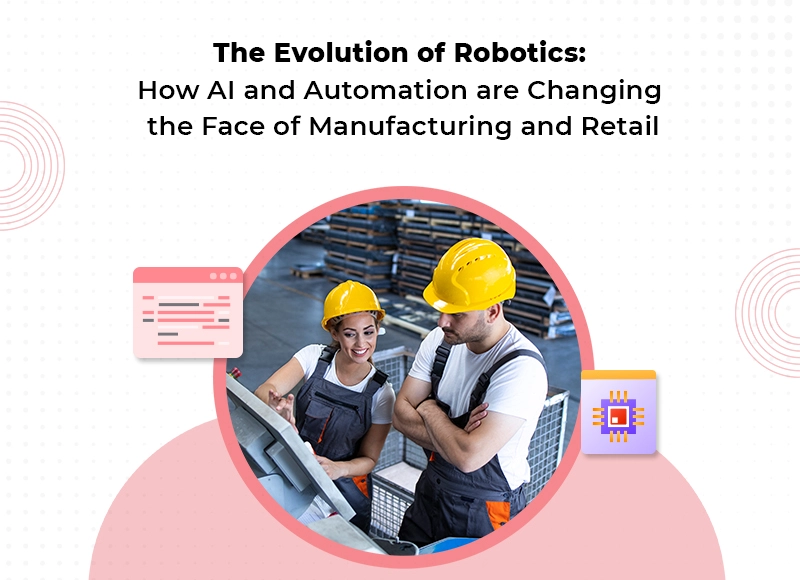Table of Contents
The future of manufacturing and retail is here, and it's powered by AI and automation. Explore the exciting possibilities of robotics in this thought-provoking article.

For decades, the concept of artificial intelligence nature robots has captivated and sparked our imaginations. Robotics concepts that were once considered science fiction are now becoming a reality for many enterprises. Over the years, robots have evolved into more than merely entertaining components in sci-fi artwork and action films. Artificial intelligence nature robots are being used by businesses to bring humans and technology closer together, solve problems, and adapt business models to meet shifting demands.
It is safe to argue that we would not have many modern conveniences without robotics and automation. Robotic advancements have facilitated many labor-intensive industrial processes while retaining product and service efficiency and standardization. Nowadays, automatic machines are designed to do repeated activities and are widely employed in manufacturing and retail.
The Rise of Robotics in Manufacturing
AI and machine learning advancements have changed manufacturing with advanced robotic systems. AI-powered robotic automation in manufacturing streamlines and enhances the efficiency of complicated procedures. Predictive maintenance algorithms use sensor data to optimize equipment maintenance and save downtime.
AI-powered vision systems improve quality control by spotting faults and anomalies quickly. Machine learning algorithms enable robots to adapt to changing work settings, which is beneficial to production automation.
End-to-end technical skills can essentially be incorporated into the automation of the manufacturing process. The AI-powered tools can be given with the knowledge to direct its installation, adoption, sensors, and analytics for detecting operational and maintenance concerns. These innovations boost productivity, eliminate errors, and maximize resource use in production, resulting in better efficiency and higher product quality.
Benefits of Robotics in Manufacturing
Industrial robots are employed across diverse industries, performing repetitive and hazardous tasks. They excel in manufacturing automation, enabling high-volume operations and increasingly benefiting medium- and small-sized businesses as costs decrease and technology advances.
Maximizing Productivity
Industrial robots speed up production process automation by running 24 hours a day, seven days a week. Breaks and shift changes are unnecessary for robots. Robot speed and dependability ultimately reduce cycle time and increase throughput. They contribute to increased manufacturing efficiency by minimizing cycle time and boosting throughput. With the ability to operate continuously, robots eliminate the need for breaks and shift changes, leading to uninterrupted production and faster turnaround times.
Improve quality and consistency
In conjunction with other technologies, such as the industrial Internet of Things (IIoT) or 3D printing robots, industrial robots can deliver higher production quality and more precise and reliable procedures. Further advantages include reduced cycle times and real-time monitoring to better preventative maintenance procedures.
Enhanced Safety
Robots in production automation reduce the danger of worker injury in hazardous environments. Remote supervision enables real-time monitoring and action, improving operational flexibility and adaptation while assuring safety and efficiency. Robots can labor indefinitely without tiring, resulting in stable productivity levels. They can also accomplish jobs with high precision, resulting in higher product quality and less waste. The employment of robots in manufacturing automation allows organizations to achieve shorter production cycles and more efficiently meet client requests.
Agile production systems
Automation systems and AI are becoming more intelligent and adaptable, optimizing output and cost. Expert systems in beverage filling and automation of production can adjust production lines and speeds automatically. Advanced Robots switch seamlessly between products, eliminating the need for line stoppages. Technologies like CNC cutting and 3-D printing allow for customized production. Automated guided vehicles enable flexible product flow and streamlined manufacturing, resulting in shorter lead times and easier customization.
Synergy and integration
Companies are under pressure to increase capital investments while decreasing product development time. Adopting easily modifiable and adaptable production systems and a platform approach to automation in manufacturing is critical. Process platforms, integration with other systems, and supplier collaboration are critical for flexible manufacturing automation. Implementing cheaper and smarter automation in manufacturing necessitates a comprehensive approach that syncs with business requirements.
Revolutionizing Retail with Robotics
The evolution of Robotics and machine learning retail is revolutionizing retail by streamlining procedures, increasing efficiency, and improving consumer experiences. From solutions for retail and automated checkout systems to robotic inventory management, cutting-edge technology is reshaping the retail business and providing shoppers around the world with convenience and innovation.
Creating A Seamless Buying Experience
Analyzing customers' preferences, browsing history, and purchasing histories, ai retail systems help retailers create customized experiences. Customers can be segmented using machine learning retail algorithms based on their behavior and preferences, allowing merchants to adapt marketing campaigns, product recommendations, and discounts to individual customers. This level of personalization can potentially improve client satisfaction, loyalty, and overall sales greatly.
Understanding Seasonal Buying Patterns
Deep learning algorithms are a subset of AI and Automation. This plays a pivotal role in retail ai by gathering and analyzing customer feedback, sentiment, and purchase data. This valuable information is then utilized to drive the development of next-generation products and services, catering to customer preferences and addressing unmet market demands. By leveraging these algorithms, retailers can create tailored offerings that align with customer needs, enhancing overall satisfaction and driving business growth.
Inventory Management and Demand Forecasting
Innovation in Robotics, specifically the use of ai in retail, enables improved demand forecasting by analyzing the best marketplaces, consumer and competitor data. AI-powered business intelligence tools leverage these insights to forecast industry shifts and drive proactive marketing, merchandising, and business strategy changes. Ai retail also influences supply chain planning, pricing, and promotional planning, optimizing overall business performance.
Supply Chain Optimization
AI retail automation optimizes retail supply chains by analyzing supplier performance, transportation costs, and warehouse capacity. It identifies inefficiencies and recommends optimal routes, shipping methods, and warehouse layouts. Ai in retail enhances efficiency, reduces costs, and meets customer expectations for quality, accessibility, and prompt support in supply and fulfillment chains.
Challenges Need to be Addressed When Adopting AI And Automation
We observed that implementing AI and automation needs organizational adjustments. Companies that try to address the five problems listed below will realize the full potential of artificial intelligence nature and automation.
Enhanced emphasis on culture and technology
Scaling automation and artificial intelligence nature across organizations requires more than just technological implementation—it necessitates a culture that embraces change. Despite the misconception, 57% of respondents believe their productivity would increase through AI and Automation experimentation. Rather than limited project-based approaches, establishing an internal team that learns by doing and aligns with an automation strategy is recommended. Celebrating early successes and building trust in new technologies are crucial steps in this process.
Skill Enhancement of Employees
According to current predictions, artificial intelligence nature robots and automation will likely replace 30% or more of tasks but only 5% of employment entirely. This means businesses must upskill and reskill existing employees by stressing enhanced social skills, empathy, and creativity while educating employees to work alongside Robots. They should also commit to fostering people rather than focusing solely on jobs. Employees understand that jobs have always evolved and will continue to evolve.
Promoting inclusivity and equity
Diversity is important from both a human and a business standpoint, but according to LinkedIn (via the World Economic Forum), only 22% of AI and Automation experts worldwide are female. The lack of diversity in the cognitive technology sector, in particular, has detrimental economic and societal consequences for individuals left behind by rapid technological advances.
From a business standpoint, a homogeneous organization creates biases and inhibits innovation and problem-solving. When establishing a new organizational structure, such constraints may result in procedures and services that do not meet the needs of every end user and client. Instead, businesses must endeavor to acquire diverse talent pools that encourage organizational resilience and various opinions.
Sustaining originality
The hype surrounding AI and automation may cause internal apprehension about implementing such new technology, impeding productivity and efficiency advantages. AI and automation entail new technology and a shift in organizational culture. This requires employee buy-in and engagement, which is supported by a commitment to transparency about where the firm is headed and how automation will play a role.
While AI is regularly mentioned, the majority of employees believe that most people know very little about it. According to a University of London study, 53% of employees are dubious when a company promises that its product or service has AI capabilities. It's critical not to overpromise and underdeliver. Instead, to create employee and consumer trust, be clear and honest.
Cultivating resilience
We don't know what skills will be valuable in the future. As a result, the task now is to encourage resilient and dynamic thinking that enables businesses to adjust swiftly to changes brought about by AI and Automation. That means every employee must adopt a growth mindset emphasizing the adaptability required to survive in a continuously changing environment.
Automation is barely getting started. Employees are free to do what people do best with Robots: think creatively to address today's most pressing challenges and plan for the future.
Conclusion
The evolution of robotics, powered by AI and automation, has ushered in a new era in the manufacturing and retail industries. These advancements have brought about unprecedented levels of efficiency, precision, and productivity. Robotics and AI technologies have enabled manufacturers to streamline their operations, reduce costs, and enhance product quality.Ai in retail has revolutionized inventory management, supply chain logistics, and customer service, leading to improved customer experiences and increased profitability.
In spite of that, the integration of robotics and AI also raises concerns about job displacement and the need for upskilling the workforce. As these technologies continue to evolve, businesses and policymakers must find a balance between harnessing the benefits of automation and addressing the societal impact. Altogether the future of robotics holds tremendous potential, profoundly shaping the landscape of manufacturing and retail.






